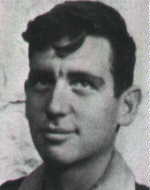Ginsburg, Raphael (“Rafi”)
Son of Emanuel and Eve. He was born on 19.6.1941 in Kibbutz Ramat Hakovesh. Two years after his birth, he was taken from his father. Among the children’s company that had parents, his orphanhood showed his discrimination – and yet he developed and grew up well and became a cheerful, playful and amusing boy. He finished elementary school in the kibbutz but during the second year of his studies there were disturbances in his life and in the life of the entire agriculture. It was the year of the War of Independence, and the agriculture, which was a school in those days, became a battlefield. The children were transferred to Kibbutz Givat Hashlosha for a while and from there they were again shackled and housed in the “Onim” institution in Kfar Sava. After the year of “exile” in which the children are home. The ruins were restored and life returned to normal. When he grew up, he began to play the harmonica and the piano and tried his hand on the piano, and he had a good hearing and an evening voice. And Rafi was drafted into the IDF in mid-August 1960 and volunteered to serve in the Air Force as an aircraft mechanic. He graduated as an outstanding trainee in the professional course and was a model soldier who performed his service with faith and devotion. When he was released from regular service, a wife married and set up a home for him, but continued to study and wanted to continue at the Technion. After his discharge from the army, he would occasionally go on reserve duty. He worked in the metalworking industry as a labor coordinator until he was accepted to the Technion in Haifa in 1970. For one year he also served as a member of the secretariat of the agriculture and was diligent and very popular with his colleagues. His two children had a father and an educator for example: quiet, patient, calm and calming, understands the child’s soul but does not exaggerate. He had a pedagogical intuition that brought great blessings to his children. One of his achievements was to impart reading to his children. When his daughter was four and a half, and the younger one was about three and a quarter, he taught them to read in a few evenings, by the way, without any pretense, by playing his own original game and method-and when both knew to read fluently, it was a miracle. On behalf of the school administration, he was offered the opportunity to specialize in the real teaching profession in order to serve as a teacher in the following classes, but he loved mechanics and returned to the Technion. But he had only learned two years. In April 1972 he received an invitation to call for active reserve duty. A day before the end of his service, he died at the time of his service, leaving a wife and three children, the third daughter was born about ten days before his death, and was brought to rest at the Ramat Hakovesh cemetery.
